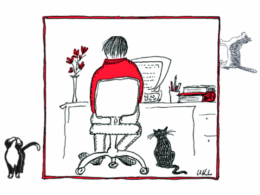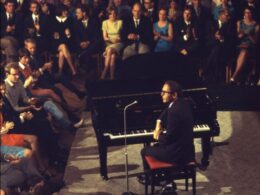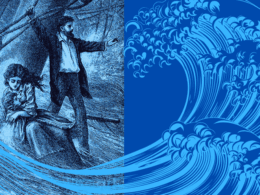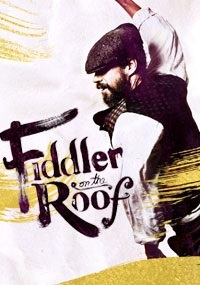
Laurence Maslon is the editor of the Library of America’s American Musicals (1927-1969): The Complete Books and Lyrics of Sixteen Broadway Classics and an arts professor at New York University. Below, he offers his thoughts on the current Broadway revival of Fiddler on the Roof, one of the sixteen works included in the American Musicals collection.
My seven-year-old son scooted himself up on his booster seat as the house lights were dimming at the Broadway Theater, where the new revival of Fiddler on the Roof had just opened. “Dad,” he asked, “is this a Jewish thing?” “Miles,” I responded quickly, as the eponymous character was about to scratch out his pleasant, simple tune, “It’s the Jewish thing.”
Almost half a century ago, when I was a seven-year-old boy, my parents took me to see Fiddler on the Roof at the Westbury Music Fair in a touring stock production starring Zero Mostel. Growing up in a largely Jewish community in suburban Long Island, I had already learned all the songs from the cast album, a souvenir from my mother’s Hadassah theater party. In our little village, among our Jewish friends, Fiddler on the Roof was the Sixth Book of Moses. We sang its songs in Hebrew school; our temple gift shop sold ceramic fiddlers on ceramic roofs; “Sunrise, Sunset” was crooned at every bar mitzvah I went to (even though it’s better suited for weddings).
The original Fiddler on the Roof opened in late September of 1964 and, from a distance of 51 years, it’s hard to see how shocking it was. Not in terms of nudity or violence, of course, but in its fearless evocation of the Jewish rituals, customs, and, well, traditions of the shtetl. Outward displays of Jewishness were hard to come by in the mainstream entertainment world of 1964. We were still a few years away from Portnoy’s Complaint, the superstardom of Barbra Streisand and Dustin Hoffman, even Irving Howe’s World of Our Fathers and Stephen Birmingham’s _Our Crowd_—two histories of European ancestry that no self-respecting Jewish family could leave off their coffee tables. Probably the most outwardly devout Jew in American pop culture at the time was Sammy Davis, Jr.
The creators of Fiddler—writers, producer, director, actors—were all Jewish and they faced a tremendous uphill battle getting their musical adaptation of Sholem Aleichem’s stories to the Broadway stage. Jews had been an essential part of Broadway musicals since the twentieth century began—Jerome Kern, Irving Berlin, Al Jolson, Fanny Brice—but blatant displays of Jewish customs, let alone the effects of Jewish persecution, were considered distasteful at worst, non-commercial at best. “Too Jewish,” was a phrase the creators heard from uninterested investors at every step of the way.
But the show itself proved everybody wrong. The director and choreographer, Jerome Robbins, realized that, in great art, the more specific your work, the more universal your appeal. Fiddler won every theater award; became the longest-running Broadway show of its era; played all over the world; was made into a successful film; and was revived on Broadway three times. The text is so well-crafted, and its influence so pervasive, that Fiddler was an easy candidate to be included in the Library of America’s American Musicals anthology of sixteen Broadway classics from 1927 to 1969. To be placed on a bookshelf next to Melville, Fitzgerald, Cather, and Baldwin—what could be more assimilated than that?
So, fifty years later, when I brought my son to see the latest revival, the approbation for Fiddler on the Roof was already assured.
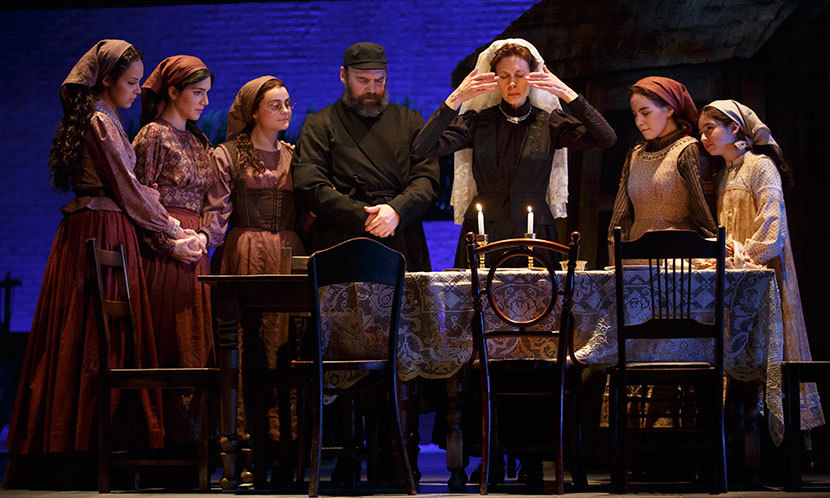
But, toward the end of director Bartlett Sher’s production, we arrived at the moment in the second act where the Jewish inhabitants of Anatevka are officially evicted from their homes: a pogrom. Sher decided to set this scene in a desolate slatted barn, with a trench-coated Russian constable lining up the Jewish villagers, who were prodded by rifle-toting soldiers of the Imperial Guard. The resonance was unmistakable. I had forgotten how replete Fiddler is with references to America, especially in the last few scenes; many of its creators—and much of its ongoing audience—were descendants of those dispossessed emigrants from Anatevka. Sher’s staging reminded us of those Jews halfway between Anatevka and Broadway, those who weren’t so lucky to make it out of Europe alive, let alone to the promised land of America.
And, by extension, we were provoked to think about those refugees from other lands, today, who seek some kind of promise and fulfillment in America. After all, if the refugees from Anatevka could come to America and make a life for their descendants—folks who could go on to make successful art out of the struggles of their forebears—why couldn’t they? Isn’t that a story that belongs to all of us?
Fiddler on the Roof isn’t a Jewish thing. It’s an American thing.
